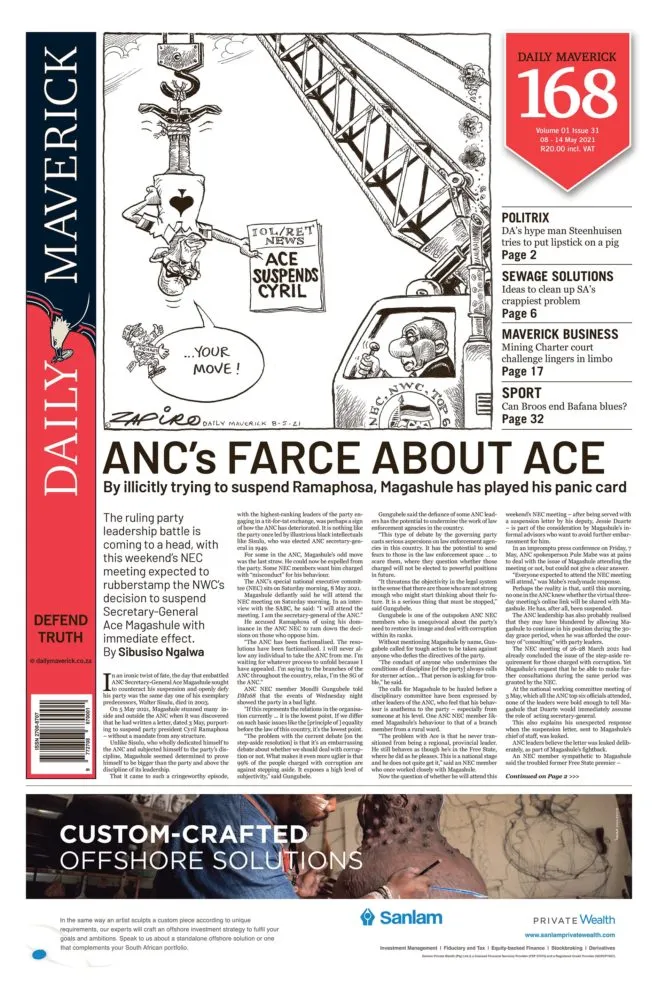BUSINESS MAVERICK 168
Once empowered, always empowered: Mining Charter court challenge in limbo

‘Once empowered, always empowered’? What if empowerment partners sell their shares? The Department of Minerals and Energy says these provisions in the Mining Charter are binding. Others say it looks like regulatory uncertainty, which is a disincentive to further investment.
First published in the Daily Maverick 168 weekly newspaper.
After four days of hearings this past week, judgment in the judicial review of the Mining Charter’s third version was reserved. Mining companies and the government remain at loggerheads over the vexed issue of “Once empowered, always empowered” – an impasse that is seen as a key deterrent to investment. It remains unresolved for now.
The mining industry argues that once a company has met the threshold for black ownership of 26% as laid out in previous charters, or 30% for new mining right applications, that holds – even if the empowerment holders subsequently sell their stake. The government’s view seems to be that such ownership targets remain in perpetuity.
There are several ways of looking at the issue. One is from the perspective of an empowerment partner, whether it is an individual or a community trust or some other entity. Some empowerment deals will lock such partners in for several years, which means that beyond dividend payments – never a certainty – the BEE partners cannot generally transform their paper into capital.
“You want to allow your black shareholders or those benefiting from the BEE deal to actually sell their shares to get liquidity and to allow that transfer of wealth. Because if you are just holding an illiquid stock which you can’t sell that doesn’t benefit anybody,” Lara Smith, director of commodities consultancy Core Consultants, told DM168.
Or this can be seen through the prism of a company in which the empowerment shareholders do sell some or all of their stake – shares on a stock exchange get bought and sold all the time. Hence the word ‘exchange’.
If your company was compliant on the Charter’s ownership targets but some empowerment holders sold their stake, bringing it to, say, 15% – or nothing – would you have to top up again? Such empowerment deals are often costly and a company does not want a situation in which it perpetually has to expend equity.
Chris Griffith, the CEO of Gold Fields, makes the point that companies that currently have locked-in mining rights don’t see it as such a headache. In a conference call about the company’s first-quarter update on 6 May, he said it would not be a concern for Gold Fields and its South Deep mine – its last operational asset in South Africa – for “the next 20 years or so.”
But he went on to say that the challenge arises if there is “change of control or if the asset gets sold. It is under those conditions, having to re-empower the company, that [it] is a major concern.”
The kind of uncertainty to which this gives rise was on display late last year, when Minerals and Energy Minister Gwede Mantashe fired a broadside at Sibanye-Stillwater, saying it had “stolen” empowerment points related to a transaction involving Tokyo Sexwale’s Mvelaphanda Resources (Mvela), which back in 2004 acquired a 15% stake in Gold Fields’ South African mines.
Most of those mines were spun off in 2013 into Sibanye, which has always maintained that the transaction meant its gold assets were “once empowered, always empowered”, even though Mvela gradually sold off its Gold Fields shares.
So the matter is a sticky one, to say the least. As Griffith noted: “Until this issue is resolved in South Africa it’s always going to look like regulatory uncertainty is a concern.”
The department of minerals and energy has acknowledged that the Mining Charter is imperfect but is “binding” – whatever that means. The Minerals Council South Africa argues that it is “flawed”. And moving beyond the empowerment matter, there are other issues.
Communities, for example, feel their voices have not been heard – a frequent and understandable complaint. Mining communities are often cut out of the consultation process on mining rights and land access, notably in the former homelands, where companies have tended to cut deals directly with the tribal authorities. For an overarching policy document such as the Mining Charter, which aims to broaden economic access to the sector, their input should certainly be taken into account.
The charter was originally envisioned to rectify the racial disparities in the mining sector. Transformation is a noble goal, and getting it right is crucial. But sorting this out is essential to South Africa’s investment climate, which must be conducive if transformation is to get off the ground. South Africa’s mining sector has many other challenges, which may not seem to be so pressing at the moment as commodity prices soar and flow to the bottom line of many companies, but that won’t last forever. DM168
This story first appeared in our weekly Daily Maverick 168 newspaper which is available for free to Pick n Pay Smart Shoppers at these Pick n Pay stores.



















 Become an Insider
Become an Insider
This “once-empowered-always-empowered” debate is sad comment on the ANC wanting handouts forever. Yes, transfer of wealth is needed. Yes, empowerment deals are needed. But ONCE. Ludicrous to expect mines to continue handing out ownership to get sold, so they hand out more – repeat forever.
Another example of ANC “empowerment” only applying to the well-connected elite. How is it that the supposed “people’s party” ignores local communities directly affected by mining, and whose land is mined? This is the blind action of greedy capitalists.
Typical annual “Christmas Box” handout philosophy by the regime! (Ref all the new fees, levies and taxes being used to fill up the empty coffers!) If they instituted regulations that the local (and maybe even labour-sending) communities and employees participated in a community trust which held the shares in perpetuity or were only allowed to trade them for other “empowerment” shares (e.g. when leaving the company, retiring or the company is sold) , then the proceeds would be shared on a much wider basis. Of course, that would mean that for the BEE “Elite” it would be a lot more difficult to get their greedy hands on the shares or money!